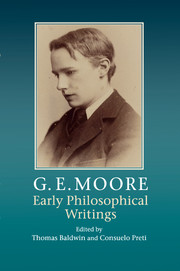Book contents
- Frontmatter
- Contents
- Preface
- Abbreviations and notes
- Editors' introduction
- THE 1897 DISSERTATION: THE METAPHYSICAL BASIS OF ETHICS
- EXAMINERS' REPORTS ON THE 1897 DISSERTATION
- THE 1898 DISSERTATION: THE METAPHYSICAL BASIS OF ETHICS
- Preface
- Table of contents
- Introduction
- Chapter I On the meaning of ‘Reason’ in Kant
- Chapter II Reason
- Chapter III The meaning of ‘Freedom’ in Kant
- Chapter IV Freedom
- Chapter V Ethical Conclusions
- Appendix on the chronology of Kant's ethical writings
- EXAMINER'S REPORT ON THE 1898 DISSERTATION
- Index
Chapter V - Ethical Conclusions
Published online by Cambridge University Press: 05 June 2012
- Frontmatter
- Contents
- Preface
- Abbreviations and notes
- Editors' introduction
- THE 1897 DISSERTATION: THE METAPHYSICAL BASIS OF ETHICS
- EXAMINERS' REPORTS ON THE 1897 DISSERTATION
- THE 1898 DISSERTATION: THE METAPHYSICAL BASIS OF ETHICS
- Preface
- Table of contents
- Introduction
- Chapter I On the meaning of ‘Reason’ in Kant
- Chapter II Reason
- Chapter III The meaning of ‘Freedom’ in Kant
- Chapter IV Freedom
- Chapter V Ethical Conclusions
- Appendix on the chronology of Kant's ethical writings
- EXAMINER'S REPORT ON THE 1898 DISSERTATION
- Index
Summary
Kant's ethical theory as a whole may be best characterised as a fusion of two wholly distinct doctrines. On the one hand his work contains an elaborate investigation into the nature and relations of the concept ‘ought’ – an investigation covering the ground of what may be called ‘Metaphysics of Ethics’. And on the other hand, it contains a peculiar and exclusive doctrine of Practical Ethics. Kant himself seems never to have perceived how distinct these two parts of his work were, and how completely the former is independent of the latter.
To the metaphysical department belongs Kant's recognition of the independence of moral law from natural law. What ought to be is something which perhaps never has been and never will be; and never, by considering what has been or what is, will you discover it. In his own language: the moral law is something a priori and no induction from experience. This doctrine at once distinguishes his system from any so-called naturalistic ethics; from the ethics based on psychological hedonism, or from modern evolutionistic systems.
And to the same department belongs his recognition that ethics must be based on law. Any ethical principle must be universal in the sense that if it is valid for you now, it must be valid for [everyone] else under the same circumstances.
- Type
- Chapter
- Information
- G. E. Moore: Early Philosophical Writings , pp. 232 - 237Publisher: Cambridge University PressPrint publication year: 2011

